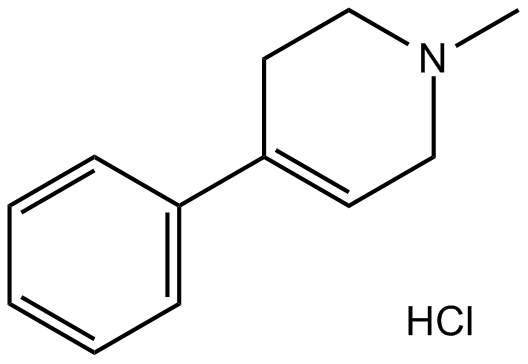MPTP hydrochloride |
| Catalog No.GC11097 |
MPTP (1-Metil-4-fenil-1,2,3,6-tetrahidropiridina) es un agente neurotóxico que es precursor de MPP+, el cual es tóxico para las neuronas dopaminérgicas y causa parkinsonismo.
Products are for research use only. Not for human use. We do not sell to patients.

Cas No.: 23007-85-4
Sample solution is provided at 25 µL, 10mM.
MPTP (1-Methyl-4-phenyl-1,2,3,6-tetrahydropyridine) is a neurotoxic agent that is a precusor of MPP+ which is toxic to dopaminergic neurons and causes Parkinsonism. It is commonly used in research to induce Parkinson′s disease models in primates. The MPTP neurotoxicity in humans is irreversible and the consequential clinical and neurochemical features closely resemble those of the idiopathic Parkinson’s disease.[1]
In vivo analysis demonstrated that systemic MPTP treatments could lead to parkinsonian. Animals developed moderate-to-severe parkinsonian signs, including a marked loss of spontaneous movements (akinesia), muscular rigidity, and severe postural instability.[2] Most of the MPTP and metabolites were excreted in the urine within the first hour after treatment. MPTP metabolite found in the urine during the first hour after treatment is MPTP N-oxide. However, MPTP N-oxide and MPP+ may cause DA depletion only if injected directly into the neostriatum.[1]
References:
[1]. Lau YS, et al. MPTP treatment in mice does not transmit and cause Parkinsonian neurotoxicity in non-treated cagemates through close contact. Neurosci Res. 2005 Aug;52(4):371-8.
[2].Bergman H, et al. Physiology of MPTP tremor. Mov Disord. 1998;13 Suppl 3:29-34.
Average Rating: 5 (Based on Reviews and 30 reference(s) in Google Scholar.)
GLPBIO products are for RESEARCH USE ONLY. Please make sure your review or question is research based.
Required fields are marked with *




